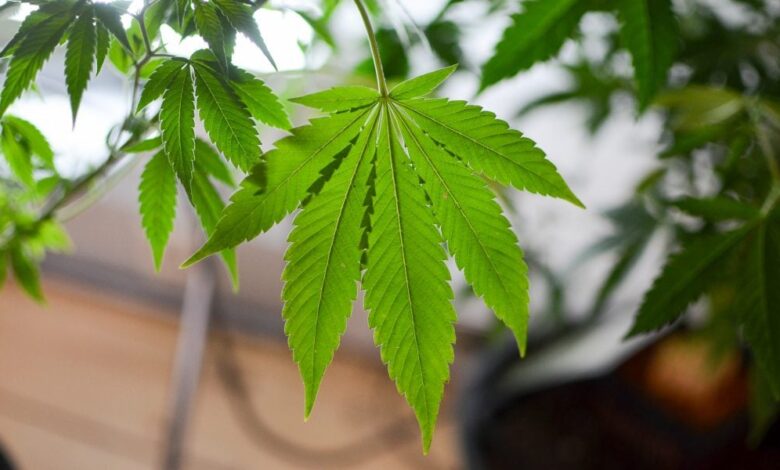Ohio Senate Panel Takes Up Bill To Amend Voter-Approved Marijuana Legalization Law, But Removes Its Tax Provisions

An Ohio Senate panel on Tuesday took testimony on a invoice that might considerably amend the state’s voter-approved marijuana legalization legislation—together with by halving the variety of crops adults might develop, creating further prison offenses and eliminating sure social fairness provisions.
Most testimony heard by the Senate Common Authorities Committee—which is predicted to vote on the proposal both this week or subsequent—was in sharp opposition to the measure, SB 56, from Sen. Stephen Huffman (R).
“SB 56 isn’t the tidying-up of a citizen-initiated statute,” ACLU of Ohio stated in written testimony. “As an alternative, it’s a rebuke of the folks and companies that drafted the initiative, voted for it, labored tirelessly to implement it, and generated (to this point) $319 million of adult-use gross sales.”
ACLU urged lawmakers to not rush the invoice, writing: “Your constituents deserve the possibility to completely weigh [in] on an vital concern they handed so resoundingly earlier than it’s demolished by politicians.”
Of 43 items of written testimony submitted forward of Tuesday’s listening to, just one was filed in help. A separate listening to on the measure final month, nonetheless, consisted principally of testimony by proponents.
In its preliminary kind, the 147-page invoice would have raised the state’s excise tax on marijuana merchandise from 10 % to fifteen % and in addition modified how taxes are redistributed to native governments. However these tax provisions had been eliminated below a substitute model of the measure authorized by the committee at Tuesday’s listening to.
One other change within the substitute expands a buffer zone between marijuana retailers from half a mile to at least one full mile, which Chair Sen. Kristina Roegner (R) stated was a request from each the state’s Division of Hashish Management and present companies.
A committee vote on SB 56 was tentatively anticipated to occur as quickly as this week, however Roegner stated Tuesday that the panel would as a substitute reconvene for additional consideration of the measure someday subsequent week.
Underneath different, remaining provisions of Huffman’s invoice, adults would have the ability to develop solely as much as six crops for private use fairly than the present 12. It will additionally lower the THC content material cap from 90 % to 70 %.
Additional, the proposal would restrict the variety of dispensaries to 350, whereas requiring all licensed retailers to serve each adult-use shoppers and medical hashish sufferers. The state Division of Hashish Management (DCC) would additionally now not be required to determine guidelines permitting for marijuana deliveries and on-line purchases.
Hashish reform advocates have blasted the measure as a rejection of the voters’ will.
“SB 56 would create a authorized minefield that re-criminalizes innocuous conduct, together with sharing hashish, smoking or vaping in a single’s yard, and having edibles in a automobile that had been ever opened,” wrote Marijuana Coverage Mission’s director of state insurance policies, Karen O’Keefe, including that the invoice additionally “lowers efficiency caps, eliminates the hashish social fairness and jobs program, and eliminates non-discrimination protections to make sure accountable hashish shoppers usually are not denied baby custody, medical care together with life-saving organ transplants, and advantages.”
O’Keefe’s testimony referred to as particulars of the proposal “needlessly onerous” and “nonsensical,” noting {that a} passenger on a ship who vapes or smokes marijuana would face a compulsory three-day minimal jail sentence that might prolong so long as six months. And she or he identified that because of its proposed restrictions on sharing, “Spouses would want to have ‘his and her[s]’ hashish! Think about being prohibited from sharing a bottle of wine with family and friends.”
“The folks spoke once they authorized Concern 2,” O’Keefe stated. “SB 56 dramatically scales again the freedoms, protections, and dedication to justice that voters authorized. It replaces them with an air of suspicion, journey wires and re-criminalization.”
O’Keefe advised Marijuana Second in a separate e mail Tuesday that “SB 56 is a slap within the face to Ohio voters, 57% of whom authorized legalization.”
“It dramatically scales again the freedoms, protections, and dedication to fairness and justice that voters authorized,” she stated. “It replaces adult-use legalization with journey wires of re-criminalization, prohibiting all the things from passing a joint to vaping by yourself porch.”
Simon Dunkle IV, the manager director of Ohio NORML, advised lawmakers that “you possibly can’t appropriate what you don’t learn about” and wrote that “as Elected Officers, you’ve gotten a Obligation to execute the Will of the Folks. You might be Public Servants, not a Monarchy or Aristocracy.”
Testimony from some critics has already resulted in adjustments to the bill. Eradicating the invoice’s earlier adjustments to tax distributions, for example, seem like in response to outcry from native governments, who broadly opposed Huffman’s proposal as filed.
Kent Scarrett, government director of the Ohio Municipal League, which represents greater than 730 cities and villages, wrote in testimony for the hearing that whereas the group appreciates SB 56’s efforts to broaden native authorities authority to ban or restrict the variety of hashish companies in a jurisdiction, municipalities are involved by its proposed adjustments to income distribution. He referred to as on lawmakers to reject the invoice.
“We urge the Legislature to keep up funding for communities that host marijuana services,” he wrote, “so these municipalities can prioritize the place the necessity is biggest of their neighborhood and work to make the best impression.”
The Ohio Mayors Alliance, which didn’t take a place on the measure, equally pointed to considerations concerning the Host Group Fund, which collects 36 % of state tax income from marijuana and routes it to native communities.
“To eradicate that income sharing fund with native communities which have acted in reliance on the existence of that fund could be essentially unfair,” the group stated. “It will additionally ignore the very actual wants of the intensive investments native taxpayers have made of their native police forces, significantly in mild of their enhanced monitoring, coaching, and enforcement duties with the creation of Ohio’s leisure
Whereas the elevated excise tax fee seems to have been eliminated within the newest model of SB 56, Gov. Mike DeWine (R) has individually indicated plans to double the double the present tax fee through the funds course of, elevating it to twenty %.
Sen. Invoice DeMora (D) said throughout an earlier committee listening to late final month that the proposal successfully quantities to legislators telling voters: “Screw you, you don’t know what you’re speaking about. You handed it with an amazing majority within the state, however we all know higher than they did what they had been voting on.”
Huffman, the invoice sponsor, stated the laws isn’t meant to “dispose of the poll initiative.”
“It’s to work across the edges to make it higher,” he said.
Sure Democrats have to this point indicated a willingness to finesse the hashish legislation, however they’ve stated Huffman’s proposed adjustments to provisions round points reminiscent of dwelling cultivation are a bridge too far.
Sen. Casey Weinstein (D), for instance, has stated there’s “positively bipartisan help for protections in advertising and marketing to maintain children secure and smart limitations on the place you should use hashish,” however not for undermining elementary parts of what voters authorized.
The invoice introduction comes as Ohio’s GOP Home speaker appears to have modified his tune on the state’s marijuana legislation, strolling again his beforehand said plan to undermine provisions of the voter-approved initiative reminiscent of dwelling cultivation rights.
Conflicts between Senate and Home Republican management close to the tip of the final session performed a key function in stalling modification proposals. It’s unclear if the chambers will have the ability to attain consensus this spherical, particularly because the market continues to evolve and shoppers undertake to the legislation.
Speaker Matt Huffman (R), who beforehand served as Senate president, stated that whereas he continues to oppose the reform measure voters handed, he doesn’t consider anybody within the legislature “realistically is suggesting that we’re going to repeal the legalization of marijuana.”
“I’m not for it. I wasn’t for the casinos coming to Ohio, both. However there’s numerous stuff that’s a part of the Structure and the legislation which are there that I don’t like,” he stated.
To that finish, the speaker indicated he’s now not focused on pursuing plans to broadly undermine the hashish legislation, regardless of having backed laws as a Senate chief final session that might have decreased allowable THC ranges in state-legal hashish merchandise, diminished the variety of crops that adults might develop at dwelling and elevated prices for shoppers at dispensaries.
Initially, adjustments backed by Matt Huffman final yr would have eradicated dwelling cultivation rights fully for Ohio adults and criminalized all hashish obtained wherever apart from a state-licensed retailer.
Whereas some Democratic lawmakers have beforehand indicated that they could be amenable to sure revisions, reminiscent of placing sure hashish tax income towards Ok-12 schooling, different supporters of the voter-passed legalization initiative are firmly towards letting legislators undermine the desire of the bulk that authorized it.
NORML just lately launched a letter-writing marketing campaign urging Ohio residents to inform their state representatives to “preserve your arms off Concern 2.”
“Even earlier than the ink on the brand new legislation is dry, some lawmakers are calling on the legislature to amend and even repeal elements of the legislation. Prohibitionist teams are equally encouraging lawmakers to take legislative motion to thwart the desire of the folks,” NORML wrote. “We should not let these teams accomplish via backroom offers what they couldn’t accomplish on the poll field. The need of the vast majority of Ohio’s voters should be revered.”
In the meantime, as 2024 got here to an in depth with the brand new marijuana legalization legislation in impact, Ohio officers introduced the state noticed adult-use hashish gross sales exceed $242 million.
Because the 2025 session will get underway, lawmakers are additionally anticipated to contemplate key adjustments to the state’s hemp legal guidelines. In November, legislators took testimony on a proposal that might ban intoxicating hemp merchandise within the state. Stephen Huffman, the sponsor of the marijuana revision invoice, launched that proposal after Ohio Gov. Mike DeWine (R) referred to as on lawmakers to control or ban delta-8 THC merchandise.
Individually, regardless of legalization of adult-use hashish in Ohio, the U.S. Division of Veterans Affairs’s (VA) Cincinnati well being heart issued a reminder final summer time that authorities medical doctors are nonetheless prohibited from recommending medical hashish to veterans—a minimum of so long as it stays a Schedule I managed substance below federal legislation.
Photograph courtesy of Philip Steffan.




